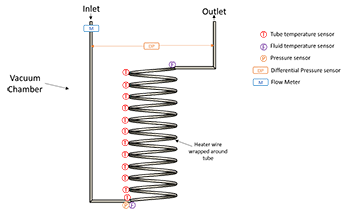Component Tests of a Cryogenic, Liquid Hydrogen Based Heat Exchanger for a Superconducting Motor
PhD student Joshua Feldman with Advisor K. Haran
This research focuses on the design of a heat exchanger for removing two to three kW of expected ac losses from the MgB2 stator armature coils of a superconducting aircraft propulsion motor. The heat exchanger will remove the heat by boiling liquid hydrogen. Here, an experiment is planned to test the heat-transfer characteristics of flow-boiling nitrogen, which can then be extrapolated for use with hydrogen. This work, funded by the NASA-funded Center for High-Efficiency Electric Technologies for Aircraft (CHEETA), seeks to study how secondary flow patterns induced by centrifugal forces in coiled tubes impact the heat-transfer coefficient and the pressure drop. Figure 3 illustrates the experiment. Fabrication and assembly are currently underway.
